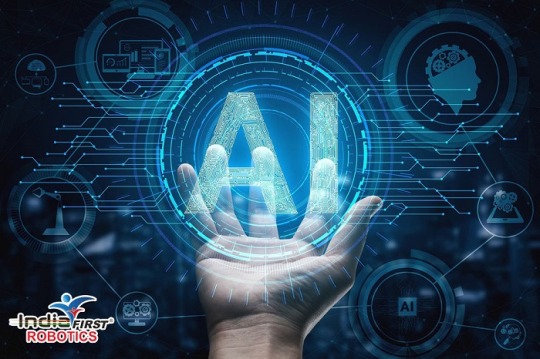#artificial intelligence job opportunities
Explore tagged Tumblr posts
Text
Artificial Intelligence on Jobs

Artificial intelligence and machine learning have seen tremendous growth in recent years, and IndiaFIRST Robotics is considered the best company for training in this area. With technological advancements and the increasing demand for automation, the job market for AI and machine learning professionals has never been more promising. In this guide, you’ll explore the various job opportunities available in this exciting field.
Overview of Artificial Intelligence and Machine Learning
Before we delve into the Artificial Intelligence and Machine Learning Job Opportunities, let's briefly look at Artificial Intelligence and Machine Learning. Artificial intelligence (AI) is a machine's ability to simulate human intelligence processes using computer systems. This includes developing algorithms that can perform tasks that typically require human intelligence, such as visual recognition, speech recognition, decision-making, and natural language processing. Machine learning (ML), on the other hand, is a subset of artificial intelligence that enables computer systems to learn from data without being explicitly programmed.
Job Opportunities in AI and Machine Learning
The demand for AI and ML professionals is on the rise, and there is a wide range of job opportunities available in this field. Some of the Artificial Intelligence on Jobs roles include:
Machine Learning Engineer: A Machine Learning Engineer is responsible for developing, implementing, and maintaining ML models. They work with large datasets to train and optimize algorithms and develop models that can be used to solve real-world problems.
Data Scientist: A Data Scientist collects, analyzes, and interprets large datasets using statistical and machine-learning techniques. They work on various projects related to predictive modeling, data mining, and data visualization.
AI Research Scientist: An AI Research Scientist works on developing new algorithms and models to improve the performance of existing AI systems. They conduct research and experiments to develop new techniques that can be used to solve complex problems.
AI Product Manager: An AI Product Manager is responsible for managing the development and deployment of AI-based products. They work with cross-functional teams to identify customer needs, develop product strategies, and ensure successful product launches.
AI Ethicist: An AI Ethicist is responsible for ensuring that AI systems are developed and used in an ethical and responsible manner. They work with teams to identify potential biases and ethical issues and develop strategies to address them.
Skills Required for AI and ML Jobs
To succeed in AI and ML, one needs to have a combination of technical and soft skills. Some of the technical skills include:
Programming Languages: Proficiency in programming languages such as Python, R, and Java is essential for AI and ML jobs.
Machine Learning: A solid understanding of machine learning algorithms, such as linear regression, decision trees, and deep learning, is important.
Data Science: Knowledge of statistical techniques and data analysis tools is crucial for data science and machine learning jobs.
In addition to technical skills, some of the soft skills required include:
Critical Thinking: The ability to analyze complex problems and develop creative solutions is essential for AI and ML jobs.
Communication Skills: Effective communication skills are important for collaborating with cross-functional teams and presenting findings to stakeholders.
Continuous Learning: The field of AI and ML is constantly evolving, and keeping up with the latest trends and technologies is important.
Conclusion
Artificial Intelligence and Machine Learning are full of opportunities for professionals with the right skills and expertise. With the demand for AI and ML professionals on the rise, job opportunities in this field are only going to increase. If you have a passion for technology and are interested in solving complex problems, a career in AI and ML might be the perfect fit. With the rapid growth in the field of AI and ML, there are endless possibilities for career growth and development.
#robotics education franchise#robotic institute franchise#stem robotics franchise#kids robotics and coding school franchise#opportunities in artificial intelligence#jobs in artificial intelligence#artificial intelligence job opportunities
0 notes
Text

Explore Career Opportunities in STEM for Teens with ENTECH Online STEM Magazine! Discover Graduate Programs, Branches, Career Paths, and Emerging Fields in Science, Technology, Engineering, and Mathematics.
#technology#science#engineering#innovation#artificial intelligence#stem student#job opportunities#mathematics
2 notes
·
View notes
Text
#job#jobs#jobsearch#best jobs#job interview#career#lucknow#jobs from home#artificial intelligence#jobseekers#fresher jobs#online jobs#remote jobs#job hunting#working#opportunity#resume#employment#bpojobs#bpo#netsuite bpo partner#innovature bpo#bpo services#bpo non voice in nagpur#outsourcing#analytics#businessgrowth#digital transformation#software#placement agency near me
3 notes
·
View notes
Text
Essential Skills for Aspiring Data Scientists in 2024

Welcome to another edition of Tech Insights! Today, we're diving into the essential skills that aspiring data scientists need to master in 2024. As the field of data science continues to evolve, staying updated with the latest skills and tools is crucial for success. Here are the key areas to focus on:
1. Programming Proficiency
Proficiency in programming languages like Python and R is foundational. Python, in particular, is widely used for data manipulation, analysis, and building machine learning models thanks to its rich ecosystem of libraries such as Pandas, NumPy, and Scikit-learn.
2. Statistical Analysis
A strong understanding of statistics is essential for data analysis and interpretation. Key concepts include probability distributions, hypothesis testing, and regression analysis, which help in making informed decisions based on data.
3. Machine Learning Mastery
Knowledge of machine learning algorithms and frameworks like TensorFlow, Keras, and PyTorch is critical. Understanding supervised and unsupervised learning, neural networks, and deep learning will set you apart in the field.
4. Data Wrangling Skills
The ability to clean, process, and transform data is crucial. Skills in using libraries like Pandas and tools like SQL for database management are highly valuable for preparing data for analysis.
5. Data Visualization
Effective communication of your findings through data visualization is important. Tools like Tableau, Power BI, and libraries like Matplotlib and Seaborn in Python can help you create impactful visualizations.
6. Big Data Technologies
Familiarity with big data tools like Hadoop, Spark, and NoSQL databases is beneficial, especially for handling large datasets. These tools help in processing and analyzing big data efficiently.
7. Domain Knowledge
Understanding the specific domain you are working in (e.g., finance, healthcare, e-commerce) can significantly enhance your analytical insights and make your solutions more relevant and impactful.
8. Soft Skills
Strong communication skills, problem-solving abilities, and teamwork are essential for collaborating with stakeholders and effectively conveying your findings.
Final Thoughts
The field of data science is ever-changing, and staying ahead requires continuous learning and adaptation. By focusing on these key skills, you'll be well-equipped to navigate the challenges and opportunities that 2024 brings.
If you're looking for more in-depth resources, tips, and articles on data science and machine learning, be sure to follow Tech Insights for regular updates. Let's continue to explore the fascinating world of technology together!
#artificial intelligence#programming#coding#python#success#economy#career#education#employment#opportunity#working#jobs
2 notes
·
View notes
Text

#artificial intelligence#machine learning#software engineering#career#jobs#opportunities#courses#internship
0 notes
Text

BTech CSE: Your Gateway to High-Demand Tech Careers
Apply now for admission and avail the Early Bird Offer
In the digital age, a BTech in Computer Science & Engineering (CSE) is one of the most sought-after degrees, offering unmatched career opportunities across industries. From software development to artificial intelligence, the possibilities are endless for CSE graduates.
Top Job Opportunities for BTech CSE Graduates
Software Developer: Design and develop innovative applications and systems.
Data Scientist: Analyze big data to drive business decisions.
Cybersecurity Analyst: Safeguard organizations from digital threats.
AI/ML Engineer: Lead the way in artificial intelligence and machine learning.
Cloud Architect: Build and maintain cloud-based infrastructure for global organizations.
Why Choose Brainware University for BTech CSE?
Brainware University provides a cutting-edge curriculum, hands-on training, and access to industry-leading tools. Our dedicated placement cell ensures you’re job-ready, connecting you with top recruiters in tech.
👉 Early Bird Offer: Don’t wait! Enroll now and take the first step toward a high-paying, future-ready career in CSE.
Your journey to becoming a tech leader starts here!
#n the digital age#a BTech in Computer Science & Engineering (CSE) is one of the most sought-after degrees#offering unmatched career opportunities across industries. From software development to artificial intelligence#the possibilities are endless for CSE graduates.#Top Job Opportunities for BTech CSE Graduates#Software Developer: Design and develop innovative applications and systems.#Data Scientist: Analyze big data to drive business decisions.#Cybersecurity Analyst: Safeguard organizations from digital threats.#AI/ML Engineer: Lead the way in artificial intelligence and machine learning.#Cloud Architect: Build and maintain cloud-based infrastructure for global organizations.#Why Choose Brainware University for BTech CSE?#Brainware University provides a cutting-edge curriculum#hands-on training#and access to industry-leading tools. Our dedicated placement cell ensures you’re job-ready#connecting you with top recruiters in tech.#👉 Early Bird Offer: Don’t wait! Enroll now and take the first step toward a high-paying#future-ready career in CSE.#Your journey to becoming a tech leader starts here!#BTechCSE#BrainwareUniversity#TechCareers#SoftwareEngineering#AIJobs#EarlyBirdOffer#DataScience#FutureOfTech#Placements
0 notes
Text
Artificial Intelligence Job-Oriented Internship Program on InternshipGate

Artificial Intelligence (AI) has emerged as a game-changer across industries, transforming the way businesses operate and solving complex problems with innovative solutions. If you're passionate about exploring AI and wish to build a career in this dynamic field, an Artificial Intelligence Job-Oriented Internship Program is the perfect gateway. At InternshipGate, we provide hands-on AI internships designed to prepare you for the demands of the real-world job market.https://internshipgate.com
Why Choose an AI Internship?
AI is revolutionizing industries like healthcare, finance, education, and e-commerce, creating a high demand for skilled professionals. Here’s why joining an AI internship can be your best career move:
Practical Exposure: Gain real-world experience by working on live AI projects.
Skill Development: Master essential tools like Python, TensorFlow, Keras, and Natural Language Processing (NLP).
Industry Insights: Understand how AI algorithms and systems are applied across different industries.
Networking Opportunities: Collaborate with industry experts and like-minded peers.
About InternshipGate’s AI Internship Program
Our Artificial Intelligence Job-Oriented Internship Program is tailored for students, graduates, and professionals looking to excel in AI. Here’s what sets it apart:
Comprehensive Curriculum:
Introduction to AI and Machine Learning.
Deep Learning Fundamentals.
Natural Language Processing (NLP).
Computer Vision Applications.
AI Model Deployment Techniques.
Live Projects:
Work on industry-relevant projects like AI-based recommendation systems, sentiment analysis tools, or image recognition systems.
Mentorship by Experts:
Learn from AI professionals with years of experience in the field.
Job Assistance:
Get access to placement support, resume building, and interview preparation.
Flexible Learning:
Choose from online or hybrid modes to fit your schedule.
Who Can Apply?
Our AI internship program is open to:
Students pursuing degrees in Computer Science, IT, or related fields.
Professionals aiming to upskill in AI.
Beginners passionate about learning AI from scratch.
Benefits of Joining the InternshipGate Program
Certification: Earn an industry-recognized certificate upon successful completion.
Skill Enhancement: Acquire job-ready skills to boost your career prospects.
Portfolio Development: Build an impressive portfolio showcasing your AI expertise.
Career Opportunities: Increase your chances of landing roles such as AI Developer, Data Scientist, or Machine Learning Engineer.
How to Apply?
Getting started is simple! Visit InternshipGate’s website and sign up for the Artificial Intelligence Job-Oriented Internship Program. Fill out the application form, and our team will guide you through the process.
Kickstart Your AI Career Today!
Artificial Intelligence is the future, and the demand for AI professionals is skyrocketing. With InternshipGate’s AI Job-Oriented Internship Program, you’ll gain the skills, knowledge, and experience needed to thrive in this cutting-edge field. Don’t wait—take the first step toward an exciting AI career today!https://internshipgate.com
#career#internship#virtualinternship#internshipgate#internship in india#job opportunities#artificial intelligence#jobseeking#jobsearch
1 note
·
View note
Text

I'm thrilled to announce that my new book, **"Future Jobs: Amazing Careers You Haven't Heard of Yet!"**, is now available on Amazon! This book is perfect for young readers aged 8-10 who are curious about the careers of tomorrow. 🚀
💡 Discover innovative jobs like AI Training Specialists and Space Habitat Designers
💡 Engage with hands-on activities and interactive learning
💡 Learn from real-life pioneers and experts
💡 Packed with colorful illustrations and fun facts
For the first seven days, enjoy an exclusive **34% discount**!
Get your copy today: [Amazon Link](https://www.amazon.com/dp/B0DSQ9S86Z)
#FutureJobs #NewBook #InnovativeCareers #STEMEducation #InspireYoungMinds #FutureOfWork
#Primary Keywords:#- future careers#- emerging jobs#- new professions#- career guidance#- job opportunities#- future of work#- career planning#- unconventional careers#- technology careers#- innovative jobs#Related Concepts:#- artificial intelligence jobs#- sustainability careers#- digital transformation#- remote work opportunities#- gig economy#- tech industry jobs#- emerging industries#- career development#- professional growth#- job market trends#Target Audience:#- students#- career changers#- job seekers#- young professionals#- career counselors#- parents#- educators
0 notes
Text
Why Study Information Technology in the UK? Key Benefits and Opportunities
Are you considering pursuing a degree in Information Technology (IT) and wondering if the UK is the right place for you? The UK is home to some of the best universities for IT education, offering world-class programs that cater to various interests within the tech world. From data science to artificial intelligence (AI), the opportunities to learn and grow in this field are endless.
To find out more about the best universities for Information Technology UK, and explore your options for an IT career that could open doors to exciting global opportunities.

Top Reasons to Study Information Technology in the UK
The decision to study Information Technology in the UK comes with numerous advantages that can set you on the path to a successful career. Here’s why the UK is one of the best destinations for IT students:
1. High-Quality Education
UK universities are recognized worldwide for their academic excellence, offering cutting-edge IT programs that blend theory and practical experience. These universities use state-of-the-art technology in their curricula and maintain strong links with industry, ensuring that students gain the skills employers are looking for.
2. World-Class Universities and Programs
The UK is home to some of the most renowned universities globally, offering specialized IT programs in fields such as Software Engineering, Data Science, Cybersecurity, Artificial Intelligence (AI), and more. Studying in these universities not only guarantees a top-tier education but also connects you with a global network of professionals.
To learn more about the best universities for Information Technology UK, and explore which institution aligns best with your career goals.
3. Strong Industry Connections and Networking Opportunities
Studying in the UK means you’ll have access to one of the most vibrant tech industries in the world. Many UK universities collaborate closely with major tech companies, offering internships, industrial placements, and research opportunities. As a student, you’ll be able to gain practical experience and network with professionals, giving you a head start in your career after graduation.
Diverse Career Opportunities After IT Studies in the UK
Graduating with an IT degree from a UK university opens doors to a wide range of career opportunities. The IT industry is one of the fastest-growing sectors worldwide, and the UK’s tech industry is no exception. Whether you’re interested in becoming a software developer, data scientist, or cybersecurity expert, the demand for IT professionals is consistently high.
1. Access to High Paying Jobs
The UK is home to major global companies such as Google, Facebook, and Microsoft, along with numerous start-ups and tech firms. As an IT graduate, you’ll have access to a wealth of job opportunities with competitive salaries. The UK’s thriving tech industry, along with its emphasis on innovation, ensures that IT professionals are highly sought after.

2. Global Recognition of UK Degrees
Degrees from UK universities are highly regarded worldwide. Employers across the globe recognize the quality of education you receive in the UK, which enhances your employability no matter where you want to work. Whether you’re planning to stay in the UK, return to your home country, or work internationally, a degree from a UK institution adds credibility to your CV.
3. Cultural Diversity and International Student Community
Studying in the UK offers an enriching cultural experience, with students from all over the world coming together. This diversity allows you to gain new perspectives, learn about different cultures, and make lasting connections with people from various backgrounds. This multicultural environment can be particularly valuable if you plan to work in international IT teams or companies.
What Makes IT Education in the UK Unique?
1. Cutting-Edge Research and Innovation
UK universities lead the way in IT research and development. With their focus on emerging technologies such as AI, machine learning, and blockchain, students have the opportunity to engage in groundbreaking research. Many UK universities partner with industry leaders to bring the latest technologies into their curriculum, giving students the chance to work on real-world problems and innovate.
2. Flexible Course Options
UK universities offer a variety of course options for IT students, including undergraduate, postgraduate, and PhD programs. Whether you’re looking for a general IT degree or a specialized course, you’ll find plenty of options to tailor your education to your interests and career goals.
Conclusion: Is Studying Information Technology in the UK Right for You?
If you’re passionate about technology and eager to pursue a career in IT, studying in the UK could be one of the best decisions you make. With top-ranked universities, strong industry connections, and a thriving job market, the UK offers everything you need to succeed in the tech industry.
To explore the best universities for Information Technology UK, and get insights on the best IT programs.

Whether you're interested in software development, data science, cybersecurity, or AI, the UK provides an outstanding environment to kick-start your IT career. Get ready for a future full of opportunities in the ever-growing tech world!
#Best universities for Information Technology UK#Information Technology programs in the UK#Study IT in the UK#Top IT degrees in the UK#IT education in the#UK universities for tech degrees#Study Artificial Intelligence in the UK#Best IT courses in the UK#UK technology education#Career opportunities in IT UK#Study Data Science in the UK#IT job opportunities in the UK#International students studying IT in the UK#Information Technology career UK#Study software engineering in the UK#IT research opportunities UK#Top IT universities in the UK#UK tech industry jobs#Postgraduate IT programs UK#UK education for IT students
0 notes
Text
youtube
AI for Income: How to Make Money with AI, Even as a Teen
In this video, we dive deep into how AI can be used to generate income, especially for younger folks. We'll explore various fields like content creation, social media management, e-commerce, education, and more. We'll also discuss lesser-known AI-powered income opportunities, such as AI in healthcare, sustainability, social good, creative tools, and personalized travel.
#AI#artificial intelligence#machine learning#AI for income#AI for teens#AI for young adults#AI jobs#AI career#AI business#AI tools#AI opportunities#content creation#social media management#e-commerce#education#healthcare#sustainability#social good#creative tools#personalized travel#Youtube
1 note
·
View note
Text
How Custom Software Development Transforms Modern Businesses: Insights from CodEduIn an era dominated by rapid technological advancements, businesses are under immense pressure to stay competitive, efficient, and customer-focused. Off-the-shelf software, while useful, often falls short in addressing the unique challenges and dynamic needs of individual businesses. This is where custom software development steps in—a solution tailored specifically to meet the requirements of a business.
CodEdu Software Technologies, based in Cochin, Kerala, specializes in creating innovative, customer-centric software solutions that empower businesses to streamline operations, improve productivity, and enhance customer experiences. In this blog, we’ll explore how custom software development is transforming modern businesses and why partnering with CodEdu can be a game-changer.
What Is Custom Software Development? Custom software development involves designing, developing, and deploying software solutions tailored to meet a business's specific requirements. Unlike generic, off-the-shelf software, custom solutions are built from the ground up to align with a company’s processes, goals, and challenges.
This personalized approach allows businesses to create tools that integrate seamlessly with their existing operations, enhancing efficiency and providing a competitive edge.
The Key Benefits of Custom Software Development
Tailored to Specific Business Needs Custom software is designed to address a company’s unique requirements. Whether it’s automating a workflow, integrating with other tools, or solving specific challenges, the solution is built to fit seamlessly into the business ecosystem.
For example, an e-commerce business may require a software system that combines inventory management, personalized customer recommendations, and a secure payment gateway. Off-the-shelf software may provide one or two of these features but rarely all in an integrated manner.
Enhanced Efficiency and Productivity Custom software eliminates redundancies and streamlines operations. By automating repetitive tasks and integrating seamlessly with existing tools, businesses can significantly reduce manual effort and focus on core activities.
CodEdu has worked with several businesses to create custom solutions that enhance efficiency. One notable example is a manufacturing client who needed real-time tracking of production cycles. The tailored solution reduced delays and optimized resource allocation, saving the client both time and money.
Scalability for Future Growth One of the major limitations of off-the-shelf software is its inability to scale. As businesses grow and evolve, their software needs change. Custom software, on the other hand, is designed with scalability in mind.
CodEdu’s solutions are built to grow alongside businesses, allowing for easy updates and additional features as new challenges and opportunities arise.
Improved Security Data security is a top concern for businesses today. Custom software allows for the integration of advanced security features tailored to the specific vulnerabilities of the organization.
Unlike generic solutions that use standard security protocols, custom software incorporates unique safeguards, making it harder for malicious actors to breach the system.
Cost-Effectiveness in the Long Run While the initial investment for custom software may be higher than purchasing off-the-shelf solutions, it offers significant savings in the long run. Businesses avoid recurring licensing fees, third-party tool integration costs, and inefficiencies caused by mismatched software capabilities.
Real-World Applications of Custom Software Development Custom software development is revolutionizing industries by offering solutions that address specific operational challenges. Here are some examples of how businesses are leveraging tailored solutions:
E-Commerce Industry E-commerce companies face unique challenges, such as managing large inventories, providing personalized customer experiences, and ensuring secure transactions. Custom software can integrate inventory management systems, CRM tools, and AI-driven recommendation engines into a single platform, streamlining operations and boosting sales.
Healthcare Sector The healthcare industry requires solutions that ensure patient confidentiality, streamline appointment scheduling, and manage medical records efficiently. Custom software allows healthcare providers to deliver telemedicine services, maintain compliance with industry regulations, and improve patient outcomes.
Education and Training Educational institutions and training academies are leveraging custom Learning Management Systems (LMS) to provide personalized learning experiences. CodEdu has developed platforms that enable online assessments, real-time feedback, and interactive learning tools for students.
Logistics and Supply Chain Logistics companies require software that provides real-time tracking, route optimization, and automated billing. CodEdu has partnered with logistics providers to build solutions that reduce operational costs and enhance customer satisfaction.
How CodEdu Approaches Custom Software Development At CodEdu Software Technologies, we believe in a collaborative, customer-centric approach to software development. Here’s how we ensure the delivery of high-quality solutions:
Understanding Business Needs Our process begins with a detailed consultation to understand the client’s goals, pain points, and operational workflows. This ensures that the solution aligns perfectly with the business’s requirements.
Agile Development Methodology We adopt an agile approach to development, breaking the project into smaller, manageable phases. This allows for flexibility, regular feedback, and timely delivery of the final product.
Cutting-Edge Technology Our team leverages the latest technologies, including AI, machine learning, cloud computing, and blockchain, to deliver innovative and robust solutions.
Ongoing Support and Maintenance Software development doesn’t end with deployment. We provide ongoing support and updates to ensure the solution remains effective as the business evolves.
Future Trends in Custom Software Development The world of custom software development is continuously evolving. Here are some trends that are shaping the future:
AI and Machine Learning Integration Artificial Intelligence (AI) and machine learning are enabling businesses to automate processes, predict trends, and provide personalized customer experiences. From chatbots to predictive analytics, these technologies are transforming industries.
Cloud-Based Solutions Cloud computing is revolutionizing software development by offering scalability, accessibility, and cost efficiency. Businesses are increasingly adopting cloud-based custom software to enable remote access and collaboration.
IoT-Driven Solutions The Internet of Things (IoT) is creating opportunities for custom software that connects devices and collects data in real-time. This is particularly beneficial in industries such as healthcare, logistics, and manufacturing.
Low-Code and No-Code Platforms Low-code and no-code platforms are simplifying the development process, allowing businesses to create custom software with minimal technical expertise. While not a replacement for traditional development, these platforms are enabling faster prototyping and iteration.
Why Choose CodEdu for Custom Software Development? CodEdu Software Technologies stands out as a trusted partner for custom software development. Here’s why:
Experienced Team: Our developers bring years of experience in crafting innovative solutions for diverse industries. Customer-Centric Approach: We prioritize your business goals, ensuring the software delivers real value. Proven Track Record: With a portfolio of successful projects, CodEdu has earned a reputation for delivering quality and reliability. End-to-End Services: From consultation to development and post-deployment support, we handle every aspect of the project. Conclusion Custom software development is no longer an option but a necessity for businesses aiming to stay competitive in today’s digital landscape. It empowers organizations to streamline operations, enhance security, and deliver exceptional customer experiences.
CodEdu Software Technologies, with its expertise in innovation and customer-centric solutions, is the ideal partner to help businesses harness the power of custom software. Whether you’re a startup looking to establish a strong foundation or an established enterprise aiming to optimize operations, our tailored solutions can drive your success.
Ready to transform your business? Contact CodEdu Software Technologies today and let’s build the future together.
#Custom Software Development#AI Software Solutions#Cloud Services#Mobile App Development#Web App Development#UI/UX Design#Quality Assurance & Testing#Front-End Development#Web Maintenance#Python Full Stack Training#Data Science Courses#Digital Marketing Certification#Artificial Intelligence Training#Internship Opportunities#Experience Certificates#100% Placement Assistance#Gap-Filling Courses#Study Abroad Preparatory Programs#Professional Development#Trending Technologies#Industry-Ready Skills#Job-Oriented Trainin
1 note
·
View note
Text
Scope for Growth after B Tech in Artificial Intelligence and Machine Learning
In recent years, artificial intelligence and machine learning had an impact on nearly every industry. As Andrew Ng (Computer Scientist and Global Leader in AI) observed, “It is difficult to think of a major industry that AI has not affected and will not transform. The industries experiencing a major impact of AI technologies include education, healthcare, retail, e-commerce services, agriculture,…
#Artificial Intelligence#btech career#career in ai#development careers#Future Technology#Machine Learning#machine learning jobs#opportunities in tech#scope for growth#tech jobs
0 notes
Text

The economic outlook for the next 3-5 years is likely to be shaped by several key trends. Firstly, inflation may remain a significant concern, impacting consumer spending and business costs. Interest rates might continue to rise as central banks aim to combat inflation, which could slow down economic growth.
Technological advancements will play a crucial role. Automation and artificial intelligence are expected to transform industries, potentially leading to job displacement but also creating new opportunities in tech sectors. The shift towards remote work could redefine workplace dynamics, influencing real estate markets and urban planning.
Additionally, sustainability will gain more attention, pushing companies to adopt greener practices. Investments in renewable energy and sustainable products are likely to rise, reflecting consumer demand for eco-friendly options.
Geopolitical factors, including trade relations and global supply chains, will also affect market stability. Uncertainties around these issues could lead to volatility in markets, making it essential for businesses to adapt quickly.
Overall, a cautious approach will be necessary as businesses navigate these complexities, balancing innovation with stability. Keeping an eye on macroeconomic indicators and being flexible in strategy will be critical for success in this evolving landscape.
#Economic Environment#Business#Finance#Future Development Trends#Artificial Intelligence#Technological Innovation#Industry Development Prospects#Sustainable Development Strategic Plan#Automation#Job Opportunities#Unemployment Rate
1 note
·
View note
Text
#job interview#career#lucknow#jobs from home#artificial intelligence#jobseekers#best jobs#jobsearch#jobs#job#employment company#employment services#employment opportunities#employment search#employment agency#careers#job search#job hunting#fresher jobs#online jobs#remote jobs#inside job#employment#workplace#working#career growth#career advice#career center#career company#career development
2 notes
·
View notes
Video
youtube
AI's Game-Changing Impact in 2024: Unlock New Careers & Online Earning S...
#youtube#AI revolution 2024#AI and global industries#AI career growth#AI impact on jobs#Artificial Intelligence opportunities#AI online earning 2024#How to earn money online with AI#AI jobs and career opportunities 2024#AI advancements in industries#AI for remote work#AI job trends 2024#Online earning with AI tools#AI for freelancers#AI-driven career growth#Tech industry trends
0 notes
Text

The Role of K.Ramakrishnan College of Technology in paving the future of Engineering
Engineering is often described as the art of applied science. It has always been at the forefront of shaping human civilization. From the construction of ancient marvels like the pyramids to the modern wonders of skyscrapers and space exploration; engineers have continually pushed the boundaries of what is possible. Now, as we stand on the brink of a new era defined by rapid technological advancement, what does the future hold for this noble profession? At K.Ramakrishnan College of Technology (KRCT), we are committed to exploring and shaping that future of Engineering.
https://krct.ac.in/blog/2024/06/25/the-role-of-k-ramakrishnan-college-of-technology-in-paving-the-future-of-engineering/
#top college of technology in trichy#quality engineering and technical education.#k ramakrishnan college of technology trichy#Artificial Intelligence and Automation#best hostal facilily and campusfuture job opportunities for ai#which is best college to study ai and other engineering in tamilnadu#krct college#krct trichy#best b.tech college
0 notes